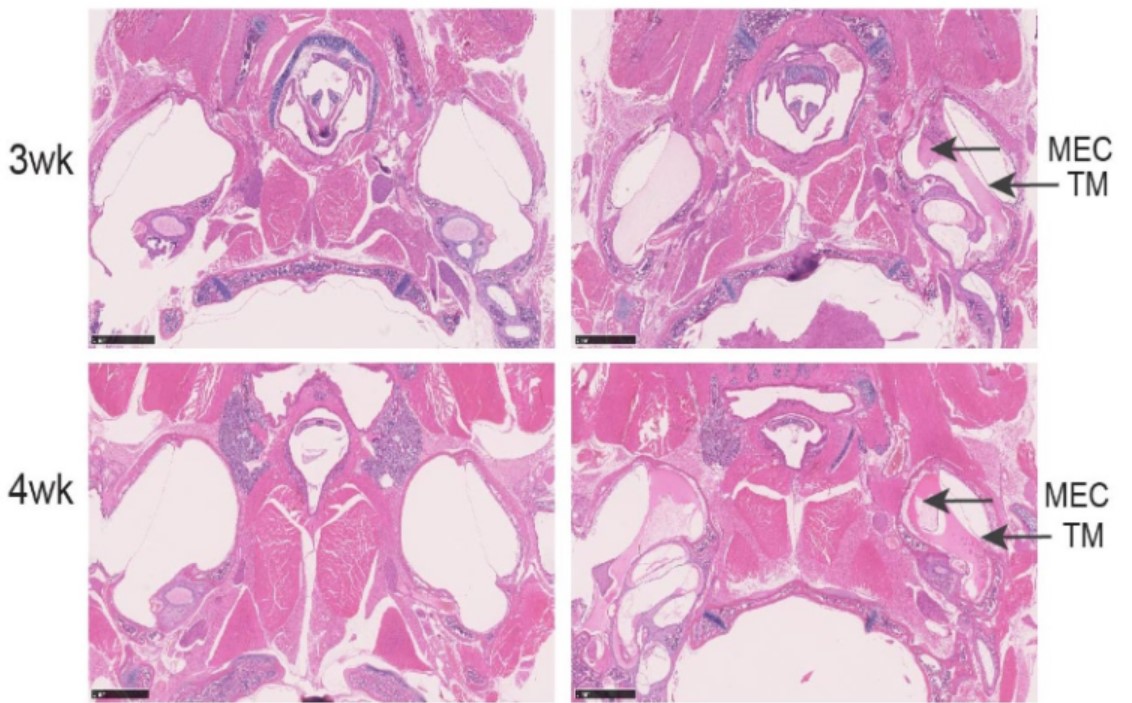LONDON, UNITED KINGDOM — A team of scientists from University College London (UCL) has identified a specific genetic cause of conductive hearing loss, the most common type of hearing loss in children with Down syndrome. The discovery, published in eLife, offers new insights into the biology of hearing loss in this population and paves the way for improved diagnostic tools, early interventions, and targeted therapies.
Understanding Hearing Loss in Down Syndrome
Hearing loss is highly prevalent among individuals with Down syndrome, with up to 75% of children affected by conductive hearing loss. This type of hearing impairment occurs when sound waves cannot efficiently pass through the outer and middle ear to reach the inner ear. It often results from anatomical abnormalities in the ear structures or chronic ear infections, both of which are common in individuals with Down syndrome.
Until now, the exact genetic mechanisms behind this condition remained unclear. Previous research has primarily focused on the physical characteristics of the ear, but this new study dives deeper into the genetic factors that predispose individuals with Down syndrome to hearing loss.
The study, led by researchers at UCL, combined genetic analysis, mouse models, and insights from clinical observations to identify specific genes and pathways involved in auditory dysfunction. According to the lead researchers, this work represents a major step forward in understanding the root causes of hearing loss in Down syndrome.
Key Genetic Findings
The researchers discovered that disruptions in a gene associated with auditory development, known as COL4A3, play a significant role in conductive hearing loss among children with Down syndrome. The gene is crucial for forming collagen, an essential protein for maintaining the structure and function of tissues, including those in the ear.
By analyzing mouse models engineered to replicate Down syndrome, the team observed changes in the structure and function of the middle ear that mirrored the hearing loss seen in humans. These findings suggest that COL4A3 mutations impair the proper formation of tissues in the ear, leading to conductive hearing loss.

Sections through the middle ear of 3 week, 4 week, 8 week and 16 week-old wild-type mice (left) and Dp1Tyb mice (right). Fluid and cellular material can be seen in the middle ear cavities in the Dp1Tyb mice. Credit: Tateossian, H. and Southern, A. et al. eLife (2025).
One of the study’s lead authors, Dr. Maria Bitner-Glindzicz from UCL, explained: “Our findings suggest that genetic changes affecting collagen production in the middle ear are key contributors to hearing loss in Down syndrome. This discovery opens new avenues for potential therapies aimed at stabilizing or restoring collagen function in the ear.”
Implications for Diagnosis and Treatment
The identification of COL4A3 as a contributor to conductive hearing loss in Down syndrome offers several promising clinical implications. Firstly, genetic testing could become an important tool for early identification of children at higher risk of hearing loss. This could enable healthcare providers to intervene earlier with hearing aids, speech therapy, and other supportive measures.
Secondly, the findings highlight potential targets for novel therapies. While hearing aids remain the primary intervention for conductive hearing loss, treatments that address the underlying genetic causes could provide longer-term solutions. For example, therapies aimed at enhancing collagen stability or function might prevent or reduce the severity of hearing loss in affected individuals.
“This research not only deepens our understanding of hearing loss in Down syndrome but also points to potential treatment strategies that could go beyond current management approaches.”
–Dr. Maria Bitner-Glindzicz
Future Directions and Broader Significance
The study sets the stage for further research into how collagen-related pathways impact auditory function, both in Down syndrome and in the broader population affected by conductive hearing loss. The team plans to investigate whether similar genetic mechanisms are at play in individuals without Down syndrome who experience conductive hearing loss.
Moreover, the findings underscore the importance of integrating genetic insights into clinical care for individuals with Down syndrome. While anatomical abnormalities and recurrent infections have long been recognized as contributors to hearing loss, this study highlights the need to address genetic factors as part of a comprehensive care strategy.
Hearing loss has long been an underappreciated barrier to communication, learning, and social interaction for individuals with Down syndrome. This research not only provides a clearer understanding of the genetic roots of this condition but also offers hope for improved diagnostics and therapies.
“We hope our work inspires further research into the genetic basis of hearing loss and ultimately leads to therapies that can improve the quality of life for individuals with Down syndrome,” Dr. Bitner-Glindzicz concluded.
Citation:
- Bitner-Glindzicz, M., et al. (2024). Genetic basis of conductive hearing loss in Down syndrome. eLife. Available at: https://elifesciences.org/reviewed-preprints/101969






